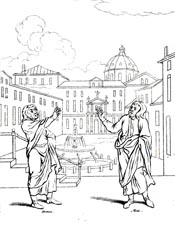Terence’s Adelphi
, translated by Kelk, Christopher (contributor-contact-email)
Adelphi is a Roman play by Terence, first staged in 160 BC, which scrutinizes contrasting parenting styles through its characters Demea and Micio. Adapted from works by Menander and Diphilus, the play revolves around Demea’s sons, Aeschinus and Ctesipho, who are raised separately by the brothers Demea and Micio. Demea, an authoritarian father, raises Ctesipho, whilst Aeschinus is brought up by the more permissive Micio. The plot unfolds as Ctesipho falls for a slave-girl musician, prompting Aeschinus to steal her away to protect his brother. Debating their respective child-rearing methods, Demea adopts Micio’s approach as a critical experiment - eventually revealing its flaws. By the play’s conclusion, the sons agree to adopt Demea’s disciplinarian approach. Recognized as Terence’s last and perhaps most accomplished work, Adelphi served as an inspiration for Molière’s The School for Husbands.

Kelk, Christopher
Support Open-Access:
Your contribution keeps our classical translations available to all. Every dollar helps support classics education and funds the expansion of our catalogue. Value what we do? Donate now.
File Downloads:
© Copyright, All Rights Reserved. This work may be freely reproduced, stored and transmitted, electronically or otherwise, for any non-commercial purpose. Conditions and Exceptions apply.